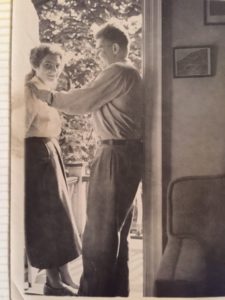Lessons From Our Ancestors: A Refugee Story (Mordy Walfish)
The stories of people coming into our country today, many of whom are fleeing harsh conditions at home, are familiar to Jewish Americans. We can take lessons from remembering the words from Exodus 23: “Also thou shalt not oppress a stranger: for ye know the heart of a stranger, seeing ye were strangers in the land of Egypt.”
I’m the grandkid of four refugees. My dad’s parents fled Eastern Europe between the two World Wars – one settled in Toronto and the other in Detroit. My mother’s parents are Holocaust survivors. I’ve always connected most to my grandmother’s refugee story. She grew up in Poland and spent her teenage years in ghettos and camps, finally being liberated from Bergen-Belsen in 1945 at the age of 18.
Though Poland was her home, she, her sister, and her mom (the only survivors in their large extended family) had no desire to return. They first smuggled their way into Belgium, where they lived for a couple of years, until making her way to Paris, which was her dream. There she lived a free and beautiful life – soaking up the culture, studying to be a Yiddish teacher and also meeting my grandfather.
Paris was always a dream for my grandmother and the freedom and depth of life she lived there in so many ways represented the counter to the enslavement she experienced during the Holocaust. My grandparents wanted to settle there, but France was not granting citizenship to Jewish refugees. They were disappointed that they couldn’t rebuild their lives in France, but grateful that they could settle permanently in Canada.

From an early age I internalized that you can’t take home, safety, and belonging for granted. And that there is so much luck of the draw between those who have access to a secure home and those who do not. Home isn’t permanent and can be really precarious; and that community sustains you, especially at times when you are denied a physical place to call home.
Refugee issues hit so close to home, in a deep and visceral way. I’d like to think that I would care about refugee issues simply as a human, but of course my own family’s history make this one feel so alive for me.
Welcoming refugees to me feels so central to Repair’s mission in so many ways. Deep down when I think about our mission, it’s about fostering a sense of connectedness between all humans – that our fates are bound up with one another. There are times in our individual lives – and in the life of the Jewish community – when we are vulnerable and need others to welcome us, to share their resources with us, to build us up and let us live our fullest lives. And there are times when we are privileged to have access to resources and we have a deep obligation to share these resources – of time, of home, of space, of money – with others. I don’t really see this as a choice. Community is what sustains us, and sharing what we have is one of the only ways to undercut the randomness of life.
(Photos courtesy of Mordy Walfish. Top: Mordy’s grandmother, mother, and uncle. Middle: Mordy’s grandparents.)

